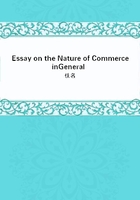
第37章
When the excessive has diminished the inhabitants of a state, those who remain to a too large expenditure, raised produce of the land and the labour of workmen to excessive prices, ruined the manufactures of the state by use of foreign productions on the part of landlords and mine workers, the money produced by the mines will necessarily go abroad to pay for the imports: this will gradually impoverish the state and render it in some sort dependent on the Foreigner to whom it is obliged to send money every year as it is drawn from the mines. The great circulation of money, which was general at the beginning, ceases: poverty and misery follow and the labour of the mines appears to be only to the advantage of those employed upon them and the Foreigners who profit thereby.
This is approximately what has happened to Spain since the discovery of the Indies. As to the Portuguese, since the discovery of the gold mines of Brazil, they have nearly always made use of foreign articles and manufactures; and it seems that they work at the mines only for the account and advantage of foreigners. All the gold and silver which these two states extract from the mines does not supply them in circulation with more precious metal than others. England and France have even more as a rule.
Now if the increase of money in the state proceeds from a balance of foreign trade (i.e. from sending abroad articles and manufactures in greater value and quantity than is imported and consequently receiving the surplus in money) this annual increase of money will enrich a great number of merchants and Undertakers in the state, and will give employment to numerous mechanics and workmen who furnish the commodities sent to the foreigner from whom the money is drawn. This will increase gradually the consumption of these industrial inhabitants and will raise the price of land and labour. But the industrious who are eager to acquire property will not at first increase their expense: they will wait till they have accumulated a good sum from which they can draw an assured interest, independently of their trade. When a large number of the inhabitants have acquired considerable fortunes from this money, which enters the state regularly and annually, they will, without fail, increase their consumption and raise the price of everything. Though this dearness involves them in a greater expense than they at first contemplated they will for the most part continue so long as their capital lasts; for nothing is easier or more agreeable than to increase the family expenses, nothing more difficult or disagreeable than to retrench them.
If an annual and continuous balance has brought about in a state a considerable increase of money it will not fail to increase consumption, to raise the price of evening and even to diminish the number of inhabitants unless additional produce is drawn from abroad proportionable to the increased consumption.
Moreover it is usual in states which have acquired a considerable abundance of money to draw many things from neighbouring countries where money is rare and consequently everything is cheap: but as money must be sent for this the balance of trade will become smaller. The cheapness of land and labour in the foreign countries where money is rare will naturally cause the erection of manufactories and works similar to those of the state, but which will not at first be so perfect nor so highly valued.
In this situation the state may subsist in abundance of money, consume all its own produce and also much foreign produce and over and above all this maintain a small balance of trade against the foreigner or at least keep the balance level for many years, that is import in exchange for its work and manufactures as much money from these foreign countries as it has to send them for the commodities or products of the land it takes from them.
If the state is a maritime state the facility and cheapness of its shipping for the transport of its work and manufactures into foreign countries may compensate in some sort the high price of labour caused by the too great abundance of money; so that the work and manufactures of this state, dear though they be, will sell in foreign countries cheaper sometimes than the manufactures of another state where labour is less highly paid.